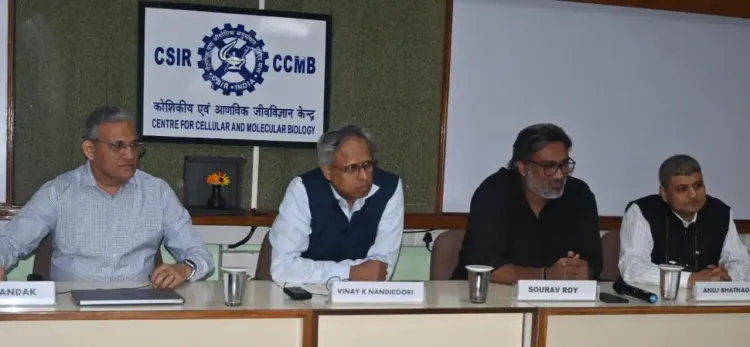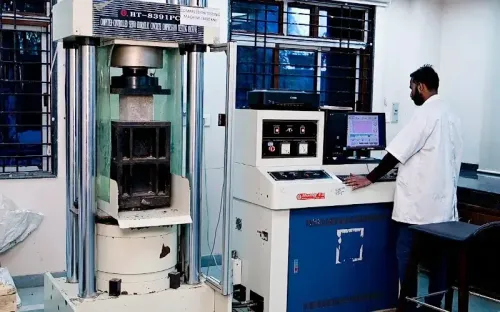Jharkhand Residents to Undergo Sickle Cell Anaemia Screening: CCMB

Synopsis
Key Takeaways
- CCMB collaborates with TSF and NHM in Jharkhand.
- Initiative aims at early diagnosis of SCA.
- Screening will start in the Kolhan region.
- Establishment of a sickle cell testing hub.
- Focus on improving public health and awareness.
Hyderabad, April 4 (NationPress) The Centre for Cellular and Molecular Biology (CCMB), an autonomous entity under the Council of Scientific and Industrial Research (CSIR), has signed a memorandum of understanding with the Tata Steel Foundation (TSF) and the National Health Mission (NHM) of Jharkhand to conduct screenings for sickle cell anaemia (SCA) among the population in this eastern tribal state.
On Friday, CCMB Director Dr. Vinay K. Nandicoori announced the initiative, which merges CCMB’s goal of early diagnosis with TSF’s dedication to improving the health of Jharkhand's residents.
The pilot project aims to assess the SCA burden in the state and support the development of preventive and management strategies for the condition.
This tripartite MoU among CSIR-CCMB, TSF, and NHM will facilitate early identification of SCA, enhance awareness about the disease, and significantly influence the public health landscape of Jharkhand.
The coordinated screening efforts will commence in the Kolhan region of Jharkhand, which includes East Singhbhum, West Singhbhum, and Seraikela-Kharsawan districts, utilizing the existing networks of NHM and TSF.
Besides training ANMs, ASHA workers, field assistants, and MANSI+ personnel from TSF, CSIR-CCMB will help establish a sickle cell testing hub for large-scale screenings of the designated population.
Jharkhand, one of the 17 states involved in the National Sickle Cell Anemia Elimination Mission (NSCAEM), faces a significant challenge with SCA due to its substantial tribal demographic. Although SCA screenings have occurred in various regions, they have been inconsistent, and thus, the outcomes may not accurately represent the true disease burden, according to CCMB.
The CSIR-CCMB will utilize its extensive experience in counseling carriers and guide couples for prenatal diagnosis to mitigate disease transmission to future generations. Meanwhile, NHM Jharkhand will ensure this screening initiative is integrated into the current healthcare framework to provide suitable management for patients.
The CSIR initiated the CSIR – Sickle Cell Anemia Mission in 2018, led by Dr. Giriraj Ratan Chandak, a senior scientist and current Sir JC Bose fellow at CSIR-CCMB. His research team has developed an affordable, efficient, rapid, and reliable Dried Blood Spot (DBS) PCR-based molecular test, which is the first of its kind.
This indigenously created Make-in-India test has been confirmed as a screening and confirmation procedure with a sensitivity and specificity of 100 percent by the Indian Council of Medical Research. This straightforward test depends on a drop of blood collected on specially designed paper, followed by direct PCR without any DBS preprocessing, and can distinguish between normal, carrier, and affected individuals at the population level.
The senior scientist highlighted that the test eliminates the need for intravenous blood collection, DNA isolation, QC checking, making it extremely high throughput. This method has been successfully implemented in several regions in Chhattisgarh, Maharashtra, Madhya Pradesh, and Rajasthan, confirming the reliability of the test results in various environments and creating a demographic map of SCA in the country.
SCA is a genetic disorder caused by a mutation in the beta globin gene, altering the structure of red blood cells (RBCs) to become sickle-shaped and more vulnerable to destruction (hemolysis), resulting in chronic anemia and vaso-occlusive crises. This disorder follows an autosomal recessive inheritance pattern, so affected children are born when carriers and/or affected individuals reproduce.
The Centre launched the NSCAEM in July 2023 with the goal of eliminating the disease by 2047 through universal screening of approximately 7 crore individuals aged 0-40 in high-prevalence areas, particularly tribal regions, coupled with counseling through cooperative efforts of central ministries.









